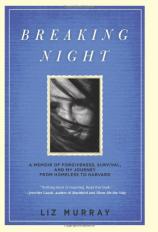Breaking Night: A Memoir of Forgiveness, Survival, and My Journey From Homeless to Harvard
Review
Breaking Night: A Memoir of Forgiveness, Survival, and My Journey From Homeless to Harvard
“For years, maybe for my whole life, it felt as thought there was a brick wall down the middle of everything… On one side of the wall there was society, and on the other side there was me, us, the people in the place I came from. Separate… The feeling in my heart was of the world being divided into an ‘us’ versus ‘them,’ and everyone on the other side of the wall felt like ‘those people.’ The everyday working people on the train, the smart students who raised their hands in class and got everything right, the functional families, the people who went away to college --- they all felt like ‘those people’ to me. And then there were people like us: the dropouts, welfare cases, truants, and discipline problems. Different.”
Sure, “tortured souls” memoirs are a dime a dozen these days. The more harrowing the author’s story, the more accolades the author gets from the press and the longer the book stays on bestseller lists. Are all of these sagas worth reading? Not by a long shot. It’s not to say these writers with unfortunate backgrounds are milking their situations (except, of course, when they are), or that their stories don’t deserve to be told (except when the book’s purpose seems to be a self-pity party or a PR stunt). But there needs to be some sort of distinction between a run-of-the-mill woe-is-me story and a book that is well-thought out, well-crafted, and well-deserving of respect and praise. Liz Murray’s memoir BREAKING NIGHT is an example of the latter.
The now-29-year-old author’s story is certainly shocking. As a child growing up in the Bronx, Liz and her older sister, Lisa, ran the household while their drug-addicted parents mainlined cocaine in plain view, breezed through the family’s paltry welfare check each month leaving nothing left over for food, and trashed the roach-infested apartment. The fact that the family wasn’t evicted is a miracle.
If that doesn’t pull at your heartstrings (or at least make you shift uncomfortably in your seat), there’s more. Before Liz had even reached puberty, she was molested by one of her mother’s “companions.” Her mother, Jean, had six schizophrenic bouts in four years, was in and out of mental institutions, and contracted AIDS. Her father continued using and moved into a shelter. And Liz was sent to live in a group home for a short stint while her sister and mother shacked up with a man Jean met at a neighborhood bar.
By the time she was 15, Liz was basically homeless --- crashing at friends’ houses after their parents had gone to work, or sleeping under bridges, on the subway, or in stairwells of random apartment buildings. Everything she owned, she carried with her on her back. She barely showered, and stole food wherever and whenever she could.
But despite all of this hardship, Liz rarely shows resentment toward her parents, and this is partly the reason why the book is so powerful. Or maybe it’s just the way Liz coped. The descriptions of her mother’s illness or the times Jean would come home drunk from the bar (“I’d take my mother and clean her up; help her, naked and vulnerable, into a warm bath; shampoo her hair as clumps of it came out in my hands. Sometimes she’d vomit in the tub and we had to start all over again”) are straightforward and factual. But there’s a hint of compassion there as well --- and self-awareness. In a letter to Jean after her death, she writes: “People had done that to you all your life, hadn’t they? Treated you like something they needed to back away from. Me too.” It’s clear Liz is working out her demons, but her words are heartfelt and true.
After Jean’s death, Liz’s life --- and her memoir --- takes a turn for the better. Well, sort of. Her circumstances haven’t changed --- she’s still homeless, broke and basically parentless --- but she makes a crucial decision: to apply to high school following years of truancy. After aiming to graduate in two years with a straight-A average --- and doing so --- she sets her mind to accomplishing other previously unimaginable goals. She applies for a New York Times college scholarship and gets it. She submits an application to Harvard and is accepted. She rents an apartment with her sister and has a home for the first time in years.
Beyond the sheer impressiveness of Liz’s accomplishments is the honesty and humility she shows when writing about her experiences. Nowhere does she gloat or preach. In fact, you get the sense that she’s still in shock that any of her successes happened at all: “Had I known how difficult it was supposed to be to interview with Harvard or the New York Times, had anyone told me that these were hard, nearly impossible things to do, then I may have never done them. I didn’t know enough about the world to analyze the likelihood of my success.” She never fails to give credit where credit is due: to her friends who supported her, to the teachers who gave her a chance, to her parents who loved her despite their faults, and most of all, to herself, for believing that she could beat the odds.
BREAKING NIGHT is, of course, the ultimate story of an underdog --- a have-not --- who triumphs over adversity, thanks to the people who love her and her own will to do what it takes to survive. But it’s also full of lessons to be learned, spoken not from the perspective of a Harvard professor, a social worker, or a sociologist, but from a person who has been there. Real questions (“How was it that anyone ended up possessing oddities such as a savings account, a car, or a house they actually owned? Getting and maintaining a job?”), frank observations (“On our side of the wall, priority was given to whatever thing might solve the most immediate problem.”), and funny but candid class distinctions (“After all, in the ghetto, by no means do we talk about things like different types of cheese…in the ghetto, we buy one kind of cheese, and that is American.”) offer up countless opportunities to think beyond the scope of one person’s story, to a broader, more accurate picture of society, its pervasive problems, and hopefully a way forward.
Reviewed by Alexis Burling on September 7, 2010
Breaking Night: A Memoir of Forgiveness, Survival, and My Journey From Homeless to Harvard
- Publication Date: September 7, 2010
- Genres: Nonfiction
- Hardcover: 352 pages
- Publisher: Hyperion
- ISBN-10: 0786868910
- ISBN-13: 9780786868919










